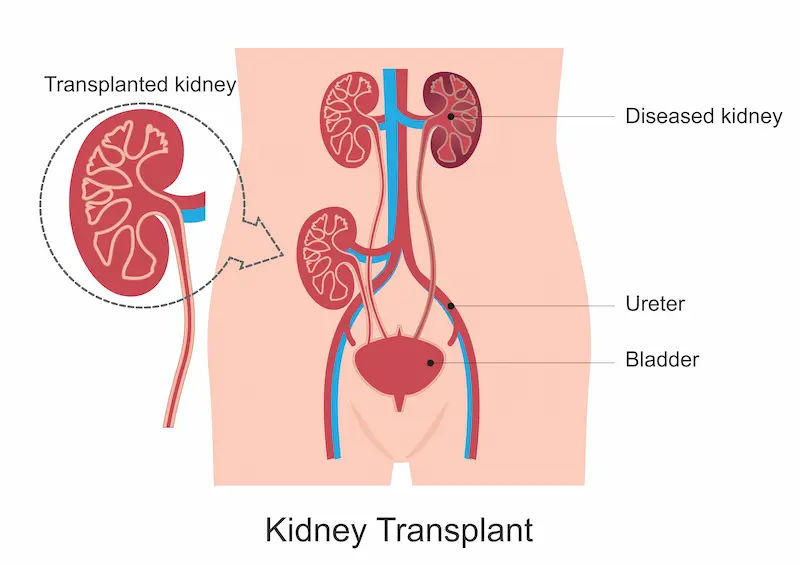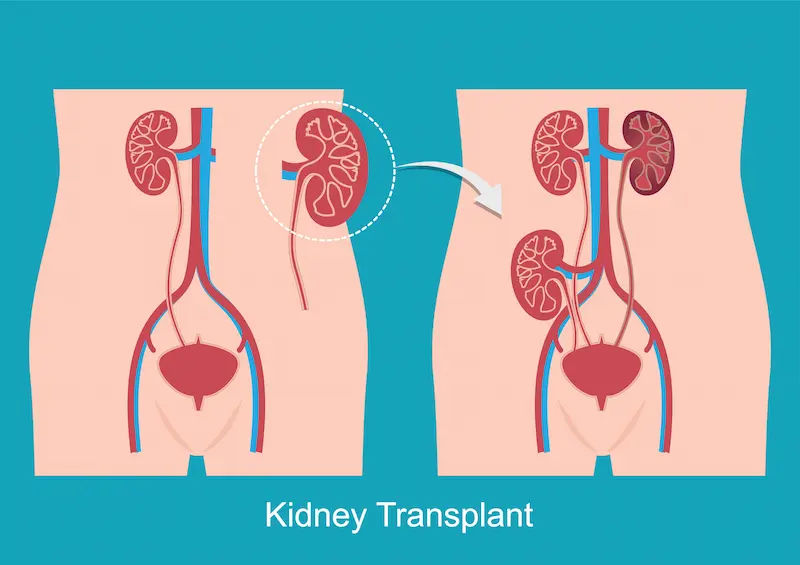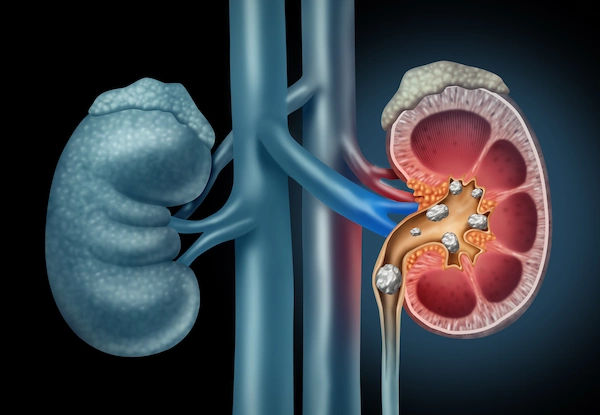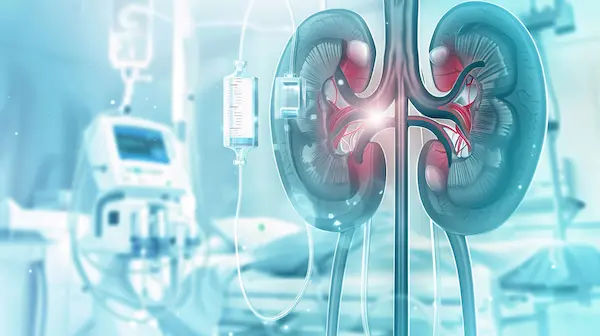Dialysis vs. Kidney Transplant: A Guide to Choosing Your Path
Explore the key differences between dialysis and kidney transplant to make an informed choice. Learn about treatment types, lifestyle impact, survival rates, costs, and eligibility for ESRD patients.

Written by Dr. J T Hema Pratima
Reviewed by Dr. Dhankecha Mayank Dineshbhai MBBS
Last updated on 13th Jan, 2026
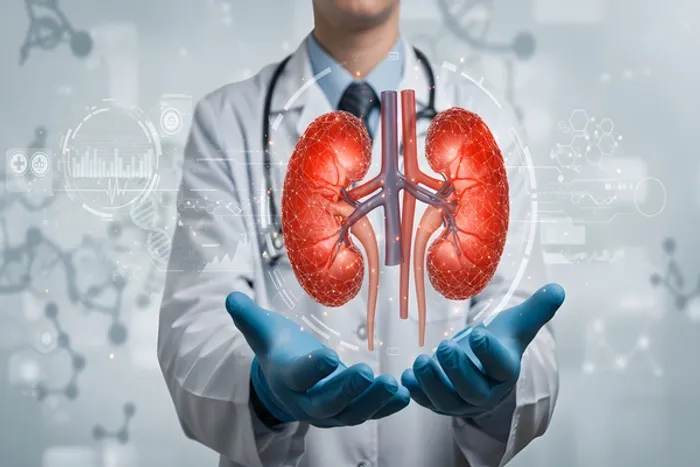
Introduction
Facing kidney failure is a life-changing diagnosis. When your kidneys can no longer function adequately, you must choose between two main treatment paths: dialysis or a kidney transplant. This decision is deeply personal and influenced by your health, lifestyle, and support system. This guide will walk you through the differences, benefits, and challenges of both dialysis and a transplant, helping you have an informed discussion with your healthcare team at Apollo24|7. Understanding your options can empower you to select the path that best aligns with your life and long-term goals.
Understanding Kidney Failure: The Reason for Treatment
Before exploring treatment options, it is important to understand what happens when the kidneys fail. Knowing how kidney function declines and the consequences of end-stage renal disease provides the foundation for making informed decisions about your care.
What is End-Stage Renal Disease (ESRD)?
End-Stage Renal Disease (ESRD) is the final, permanent stage of chronic kidney disease, where kidney function has dropped to 10–15% of normal. The kidneys can no longer remove waste, control fluid balance, or manage electrolytes. This leads to a dangerous buildup of toxins in the blood, making dialysis or a transplant essential for survival.
The Role of Your Kidneys and What Happens When They Fail
Your kidneys filter about 200 quarts of blood daily, removing roughly 2 quarts of waste and extra water as urine. They also release hormones that regulate blood pressure, produce red blood cells, and strengthen bones. Kidney failure may cause fatigue, nausea, swelling, and shortness of breath. Without treatment, ESRD is fatal.
Consult Top Doctors for Personalised Advice
Treatment Option 1: Dialysis
Dialysis is a life-sustaining treatment that takes over some of the work your kidneys can no longer perform. This section will explain how dialysis works, the different types available, and what living with dialysis entails.
What is Dialysis? The Artificial Kidney
Dialysis performs the function of healthy kidneys. It does not cure kidney disease but helps filter waste, salt, and extra fluid from the blood, allowing you to live longer and feel better. Dialysis is life-sustaining until a transplant is possible.
Types of Dialysis: Hemodialysis and Peritoneal Dialysis
There are two main types of dialysis, each with its own approach and lifestyle implications.
1. Hemodialysis: How it Works, Pros, and Cons
Hemodialysis uses a machine called a dialyser to clean your blood. Blood is pumped out, filtered, and returned. Typically performed at a dialysis centre three times a week for around four hours per session.
- Pros: Administered by medical professionals, no daily home responsibility.
- Cons: Strict schedule, travel required, "ups and downs" post-treatment, strict dietary and fluid limits.
2. Peritoneal Dialysis: How it Works, Pros, and Cons
Peritoneal dialysis uses the lining of your abdomen as a natural filter. A catheter introduces special fluid to draw waste from blood vessels, which is then drained. This can be done at home, even overnight.
- Pros: Flexible schedule, fewer dietary restrictions, no needles.
- Cons: Daily procedure required, risk of abdominal infection, storage space needed for supplies.
The Lifestyle Impact of Living on Dialysis
Life on dialysis requires significant adjustment. It demands time, strict diet control, and fluid restrictions. Work, travel, and daily routines can be affected. Many patients live well on dialysis for years, but it requires discipline and strong support.
Treatment Option 2: Kidney Transplant
A kidney transplant offers the possibility of restoring normal kidney function and improving quality of life. Here, we outline the transplant process, what to expect before and after surgery, and the long-term considerations involved.
What is a Kidney Transplant? A New Lease on Life
A kidney transplant involves surgically placing a healthy donor kidney into your body. Unlike dialysis, which is ongoing, a transplant can restore normal kidney function. It generally offers better quality of life and longer survival.
The Transplant Process: From Evaluation to Surgery
Transplantation starts with an evaluation at a transplant centre to ensure surgical fitness. You may be placed on a national waiting list for a deceased donor or receive a kidney from a living donor, which can significantly shorten or eliminate waiting time.
Life After a Transplant: Immunosuppressants and Monitoring
A transplant is not a cure. Your body may reject the new kidney, so lifelong immunosuppressant medication is required. Regular check-ups are essential to monitor kidney function and overall health. Any warning signs, such as fever or swelling at the transplant site, require prompt consultation with your doctor via Apollo24|7.
Direct Comparison: Dialysis vs. Transplant
Choosing between dialysis and a transplant involves evaluating several factors. This section highlights the key differences in lifestyle, survival, and long-term outcomes to help you weigh your options.
Quality of Life: Freedom and Flexibility
Transplant patients generally enjoy greater freedom, fewer dietary restrictions, and more energy. Dialysis, while life-saving, imposes a more rigid routine and physical strain.
Long-Term Survival Rates and Life Expectancy
Studies show that kidney transplants typically offer longer life expectancy than long-term dialysis. However, the initial surgery carries its own risks and must be considered carefully.
Financial Considerations and Cost of Treatment
Both options are costly. Dialysis has ongoing, indefinite expenses, whereas a transplant has high upfront costs but lower long-term costs for medication and follow-up care. Insurance coverage and financial planning are important considerations.
Making the Decision: Key Factors to Discuss with Your Doctor
Selecting the right treatment is a collaborative process with your healthcare team. This section focuses on the personal, medical, and practical considerations to discuss before making a decision.
Your Overall Health and Eligibility for Transplant
Not everyone qualifies for a transplant. Factors such as advanced age, severe heart disease, active cancer, or infections can make surgery risky. A thorough evaluation is essential to determine eligibility.
The Reality of the Waiting List for a Deceased Donor
Demand for kidneys exceeds supply, with average wait times for deceased donors ranging from 3–7 years. Dialysis may be necessary while waiting.
The Importance of a Living Donor
A living donor can allow for elective surgery, sometimes before dialysis is needed. Living donor kidneys tend to function better and last longer, making this the preferred option when available.
Conclusion
Choosing between dialysis and a kidney transplant is one of the most significant decisions for someone with ESRD. Dialysis is life-saving and allows you to manage your condition, while a transplant offers the potential for a more normal and longer life. The right choice depends on your health, lifestyle, support network, and readiness for long-term treatment responsibilities. Open conversations with your medical team at Apollo24|7, asking questions and sharing concerns, will help you make an informed decision. Early consultation with a nephrologist is essential if you experience symptoms of kidney disease.
Consult Top Nephrologists
Consult Top Nephrologists

Dr. Manju Kamal
Nephrologist
12 Years • MBBS,MD(General Medicine), DNB,DM(Nephrology)
Angamaly
Apollo Hospitals Karukutty, Angamaly

Dr. Akash Deep Suri
Nephrologist
17 Years • MD,DM,DNB
Bhopal
Apollo Sage Hospitals, Bhopal
(25+ Patients)

Dr. Vamsee Priya Marina
Nephrologist
13 Years • MBBS, MD (Internal Medicine), MD (Nephrology), Diplomate American Board of Internal Medicine
Hyderguda
Apollo Hospitals Hyderguda, Hyderguda
(50+ Patients)

Dr Ajay Kumar Sharma
Transplant Specialist Surgeon
39 Years • MBBS, MS, DNB, FRCS (Glas), FRCS (Edin), FRCS (General Surgery), MSc Medical Education
Delhi
Apollo Hospitals Indraprastha, Delhi

Dr. Chaitanya Subhash Kulkarni
Nephrologist
8 Years • MD,DNB
Bhopal
Apollo Sage Hospitals, Bhopal
(25+ Patients)
Consult Top Doctors for Personalised Advice

Dr. Manju Kamal
Nephrologist
12 Years • MBBS,MD(General Medicine), DNB,DM(Nephrology)
Angamaly
Apollo Hospitals Karukutty, Angamaly

Dr. Akash Deep Suri
Nephrologist
17 Years • MD,DM,DNB
Bhopal
Apollo Sage Hospitals, Bhopal
(25+ Patients)

Dr. Vamsee Priya Marina
Nephrologist
13 Years • MBBS, MD (Internal Medicine), MD (Nephrology), Diplomate American Board of Internal Medicine
Hyderguda
Apollo Hospitals Hyderguda, Hyderguda
(50+ Patients)

Dr Ajay Kumar Sharma
Transplant Specialist Surgeon
39 Years • MBBS, MS, DNB, FRCS (Glas), FRCS (Edin), FRCS (General Surgery), MSc Medical Education
Delhi
Apollo Hospitals Indraprastha, Delhi

Dr. Chaitanya Subhash Kulkarni
Nephrologist
8 Years • MD,DNB
Bhopal
Apollo Sage Hospitals, Bhopal
(25+ Patients)
More articles from Kidney Failure
Frequently Asked Questions
Can I get a kidney transplant without being on dialysis?
Yes. A pre-emptive transplant is possible if you have a living donor and your kidney function is declining but dialysis has not yet started. This avoids dialysis altogether.
What is the average life expectancy after a kidney transplant?
Life expectancy varies by age, health, and donor type. Kidneys from living donors typically last 15–20 years, while those from deceased donors last 10–15 years. Many recipients live long, full lives.
What are the main risks of a kidney transplant?
Risks include surgical complications, organ rejection, and side effects from immunosuppressants, such as increased infection risk, weight gain, diabetes, and high blood pressure.
How long does a dialysis session take?
Hemodialysis usually lasts about 4 hours, three times per week. Peritoneal dialysis is performed daily, either through multiple daytime exchanges or one long overnight session.
Is a kidney transplant more cost-effective than dialysis?
Though initial transplant costs are high, annual maintenance costs are generally lower than long-term dialysis, making it more cost-effective over a lifetime and allowing easier return to work.
